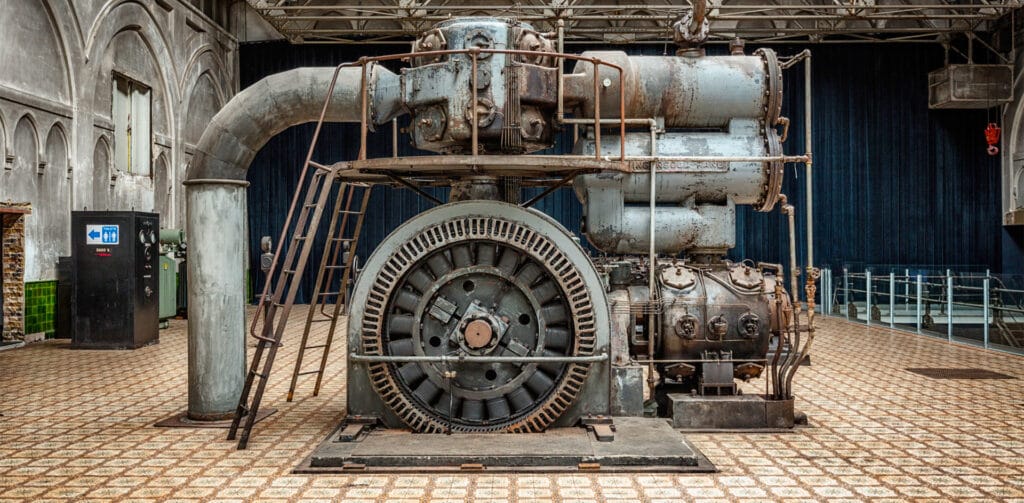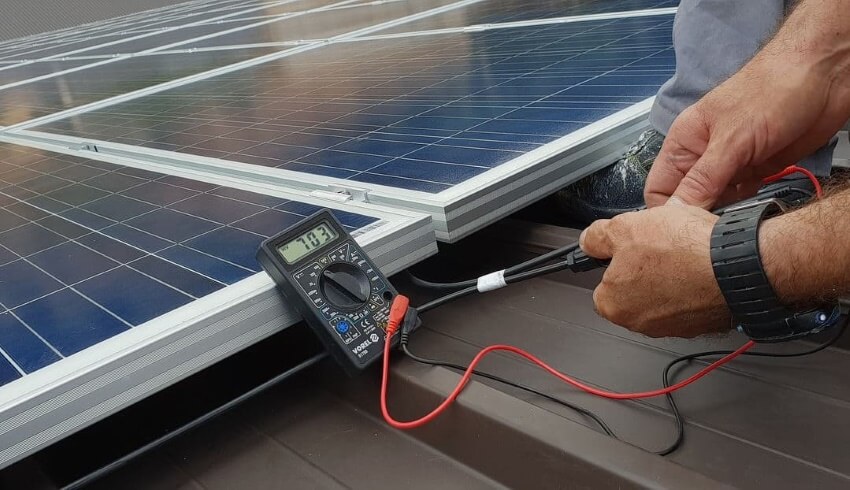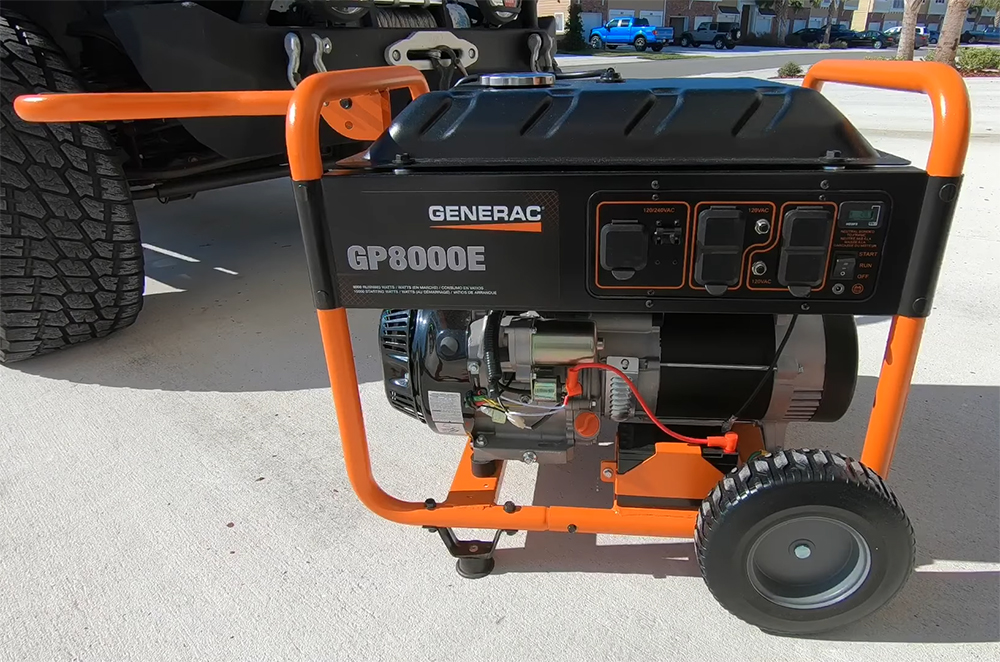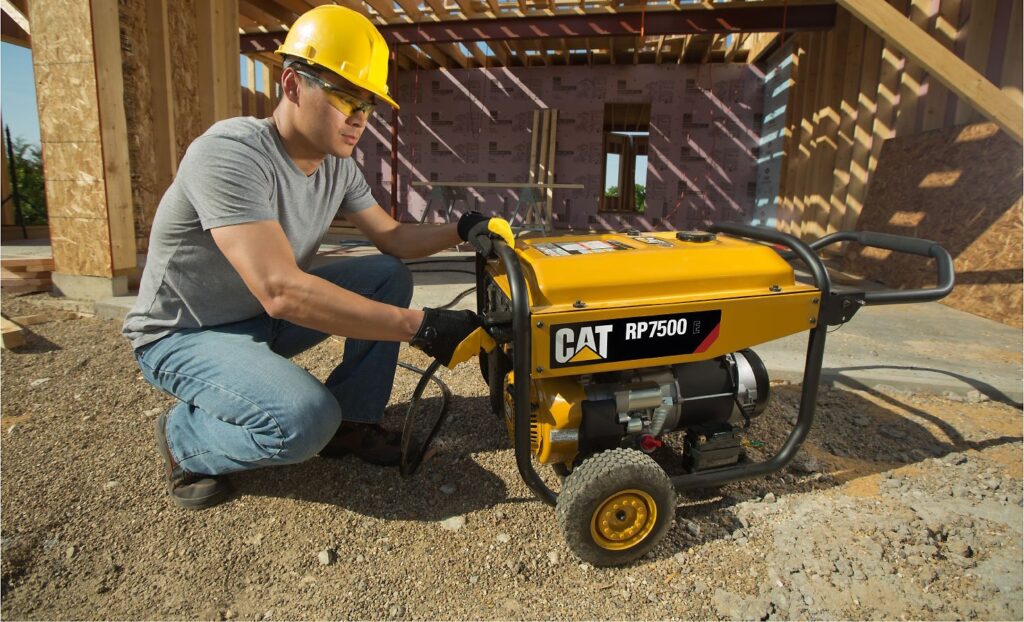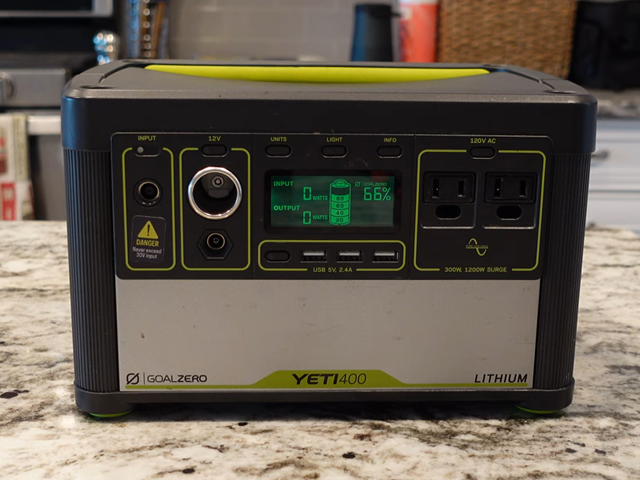
When the power goes out, whether from a storm or a larger emergency, having the ability to keep all your appliances running and your lights on can make a big difference in your comfort and safety. Whole-house generators offer enough power to run your essential appliances and more for extended periods of time, keeping you comfortable no matter what is going on outside.
In order to help you find the best whole-house generator for your home, we considered a number of features that differentiate these generators. First, we looked at how much power they are able to put out, since this determines which and how many appliances you’ll be able to power. Second, we looked at the capacity of the fuel tank and how long the generator will run for, since you don’t want to have too many breaks in your power supply. Finally, we considered how much noise different generators make and whether they come with a manufacturer’s warranty.
We spent tens of hours researching technical specifications and customer reviews for the most popular whole-house generators on the market to come up with our five favorites, highlighted in the table below. Continue reading for detailed reviews of each whole-house generator, complete with pros and cons. Our buying guide covers everything you need to know about choosing the best generator for your home. Finally, we sum up the three overall best standby generators on the market today.
This standby generator from Generac is designed to handle the power needs of large homes with a lot of appliances or multiple air conditioning units thanks to its whopping 22-kilowatt power output on liquid propane and 19.5-kilowatt output on natural gas. The generator also comes with a 200-amp smart transfer switch, which allows the generator to start itself automatically when it senses the power goes out.
Surprisingly for its size, this generator is one of the quietest we reviewed. It is capable of producing as little as 57 dB of noise, although this can increase as the generator’s output approaches its maximum power. In addition, generator tests are run at even lower noise levels so they won’t bother the neighbors. A mobile-friendly application built into the generator allows you to monitor its activity from your smartphone.
There are a few drawbacks to this generator. First, and most notably, it uses a lot of fuel when it is running – 92 cubic feet of propane per hour or 228 cubic feet of natural gas per hour at half load. That not only means that you’ll spend more on fuel to run this generator, but means that you could find yourself running out of fuel in roughly half the number of days as your neighbors. However, this is not a huge problem for houses that expect to run on natural gas.
In addition, the generator only supplies voltage at 240 volts, so you’ll need to wire a step-down transformer into your circuitry in order to use the power for the majority of your home appliances and lights.
The third 6500-watt generator we recommend is the Briggs & Stratton Q6500, which offers impressive performance with its 306cc integrated engine and alternator. It gives you up to 14 hours of runtime and produces power that is 60% quieter than your standard generator. Safety is no problem with this generator, which is fitted with a CO guard technology that turns it off when harmful levels of carbon monoxide are released.
The Briggs & Stratton Q6500 generator is best suited for those who want a compact-sized generator for use on the go. If you need a generator for a job where you move around a lot and require easy storage, this unit is the ideal choice. It has a design that is 30% lighter and 45% more compact than most generators. With the suitcase-style handle ad wheels, you can easily move it around.
If you need a whole house generator for your small home, the Champion 8.5-kW Home Standby Generator is the ideal choice. With the advanced sound dampening and low-tone muffler, the unit operates very quietly at a residential-friendly level. This generator also performs weekly self-diagnostic tests and requires no warming kit, making it highly efficient. With 8500 watts on propane and 7500 watts on natural gas, the 8.5-kW generator offers enough power for your home.
The Champion 8.5-kW Home Standby Generator is best suited for those who want an efficient and automatic generator. It is totally automatic, with an 8-circuit transfer switch. The switch offers seamless power to your home whenever there is an outage. There is no manual operation or extension cord required when using this unit.
This reliable generator from Kohler boasts an impressive 20 kilowatts of power when running on liquid propane or 18 kilowatts when running on natural gas. The 999cc Kohler engine is designed to outlast any power outage, and users report that it can run for upwards of a week without issues.
The generator comes with a 100-amp transfer switch, which allows you to hook the generator directly to your home’s circuit board. Better yet, the generator will automatically sense when the line power fails and turn on by automatically tripping the transfer switch within 10 seconds of the power outage.
In addition, this generator has a feature called load shedding, which allows you to connect certain appliances – like secondary air conditioning units – to a circuit that will be automatically turned off if the generator is temporarily overloaded. That means you don’t have to count watts when turning on a new appliance for a short time, such as to do the laundry or wash dishes.
The main downside to this generator is that it can be quite loud, producing up to 69 dB of noise. For houses in close lots to their neighbors, this can be loud enough to generate complaints. In addition, users found that Kohler’s engine suffers from frequent throttling issues, which can cause the power to flicker and can prevent this generator from being safely used with sensitive devices and appliances. While Kohler offers a five-year warranty on their generator, the company does not seem to consider units with this throttling issue defective under the warranty.
This inexpensive generator from Champion is best for very small homes or for homeowners on a budget who are willing to commit to running only a subset of appliances after the power goes out. The reason for this is that the generator has a relatively low power rating of just 14 kilowatts on liquid propane or 12.5 kilowatts on natural gas – comparable to the most powerful portable generators.
That said, this generator is extremely modest in its fuel consumption as well, which can be a significant advantage during extended outages when stockpiled propane is at a premium. The generator consumes just 58 cubic feet of propane per hour and 116.5 cubic feet of natural gas per hour at half load, roughly one-third less than larger 20-plus-kilowatt standby generators.
In accordance with the modest power rating, this generator comes with a transfer switch that is capable of powering only eight circuits. However, those circuits can receive either 120 volts or 240 volts, so you do not need an additional step-down transformer in your wiring. Like other standby generators, this model will start automatically when it senses the line power fail, and it even offers load shedding capabilities to shift around high-demand appliances to prevent overloading.
While the generator is somewhat loud for its size at 63.5 dB, this is still a reasonable noise level for most residential neighborhoods. In addition, Champion goes above and beyond by providing an impressive 10-year warranty on this generator as well as free lifetime technical support.
This versatile generator from Briggs & Stratton is designed to offer you the most power possible in a compact unit. The generator is rated for up to 20 kilowatts of power on liquid propane or 18 kilowatts on natural gas but is designed to handle houses with even larger power demands. The secret to this is the Symphony II power management built into the generator, which coordinates between high-demand appliances like air conditioners and low-demand appliances like microwaves and toasters to ensure that power is balanced without overloading the generator.
Another advantage to this generator is that the design is kept as compact as possible, making it easier to fit within your home’s lot lines according to your local regulations. The generator is just 30 inches from front to back and five feet long.
Like other standby generators, this model is able to turn on automatically when the power goes out thanks to an included 150-amp transfer switch. The fuel consumption by this generator is surprisingly modest given its power capabilities. It uses just 187 cubic feet of natural gas at half load or 83 cubic feet of propane at half load.
The only real downside to this generator is that it can be quite loud, at up to 69 dB. Especially considering that the compact size of the generator is designed to fit within tight suburban neighborhoods, this loud noise to power ratio can be problematic for keeping up relationships with neighbors.
Briggs & Stratton provide a five-year warranty on this generator and users note that it performs extremely reliably when the power goes out for days at a time.
This moderately sized generator from Generac is unique in that it boasts the same 16-kilowatt power rating regardless of whether it is running on liquid propane or natural gas. That makes it an ideal choice for households that plan to switch frequently between the two fuels and don’t want a generator that offers unnecessary excess power on propane.
Fuel consumption is slightly lower than on other standby generators, in line with the smaller power output of this generator. The unit uses 218 cubic feet of natural gas per hour or 74 cubic feet of propane per hour at half load, which is ideal if you are depending on a limited stockpile of propane during a multi-day power outage.
Note that while this generator comes with a 100-amp transfer switch that allows it to turn on automatically, it does not offer the “smart” load shedding capabilities of other generators in this class. While this may not be an issue for smaller homes that fit well within the 16-kilowatt rating, it can be problematic for homes that are frequently threatening to overload the generator.
That said, another advantage to this generator is that it produces a relatively low level of noise – just 55 dB at low power output – which makes it easier for your family and your neighbors to sleep at night. In addition, the generator can connect to Wi-Fi so that you can receive alerts when the generator turns on and monitor the status of its maintenance cycles.
Generac provides a five-year warranty with this generator.
Now that you’ve learned more about our five favorite whole-house generators on the market today, how do you choose between them to find the right one for you? There are a number of considerations that go into choosing the optimal generator for your home, so our buying guide will walk you through everything you need to know in order to make the best choice.
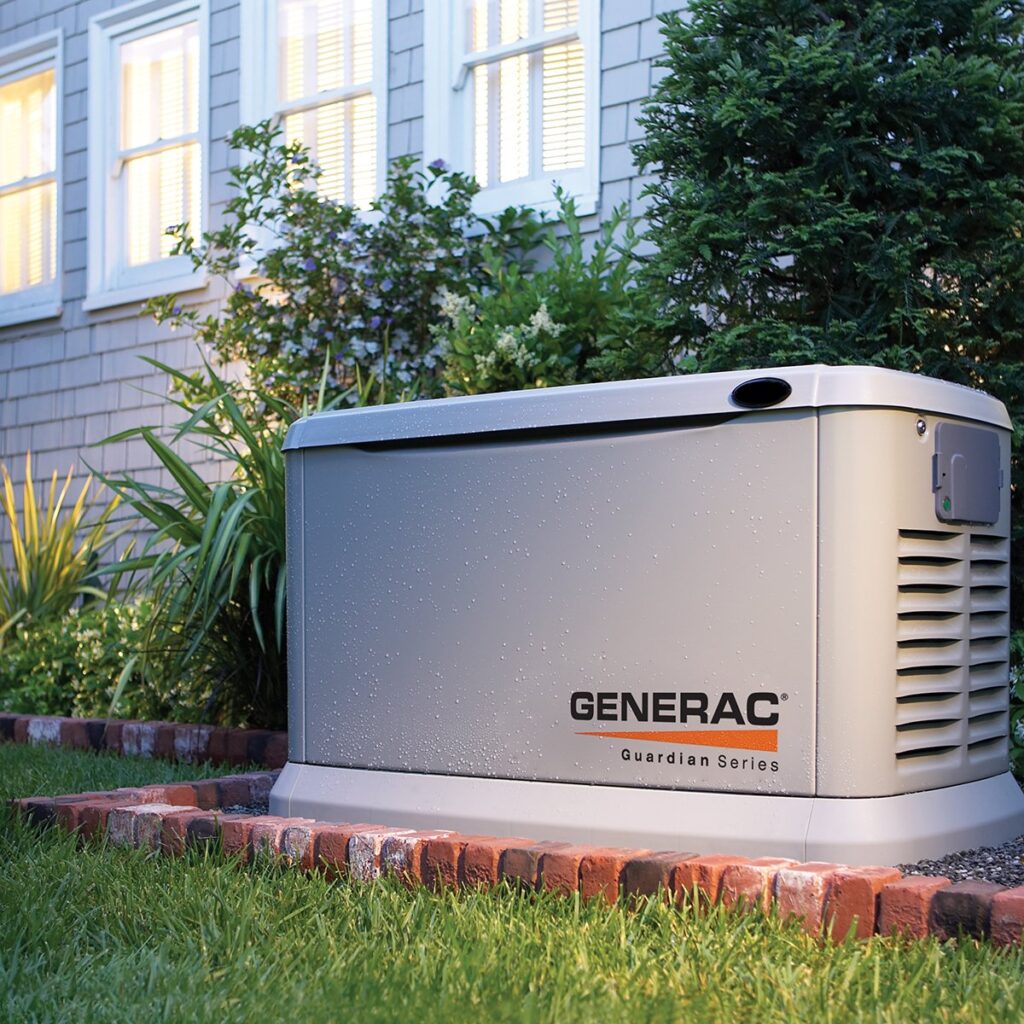
The type of fuel that standby and portable generators use is another important difference. The vast majority of portable generators have engines that run on gasoline only, or gasoline and propane. While there are tri-fuel portable generators that can run on gasoline, propane, or natural gas, these are relatively specialized and are not frequently marketed. On the other hand, standby generators almost universally run only on propane and natural gas and not gasoline.
There are a couple reasons for this. First, propane and natural gas are much less expensive than gasoline when buying in large quantities, and standby generators require much more fuel than any portable generator. Second, propane can be stored for years in preparation for an emergency before it goes bad, whereas gasoline needs to be replaced every several months. Finally, many homes already have natural gas lines that may still operate even when the power grid is down, so it makes sense to have the option to run using natural gas for a home generator.
Another important difference is that standby generators are fully enclosed to withstand any weather conditions, whereas a portable generator typically has exposed engine parts that can get quite hot in order to reduce weight. Standby generators will also often automatically turn on when the power goes out, whereas all portable generators must be started manually.
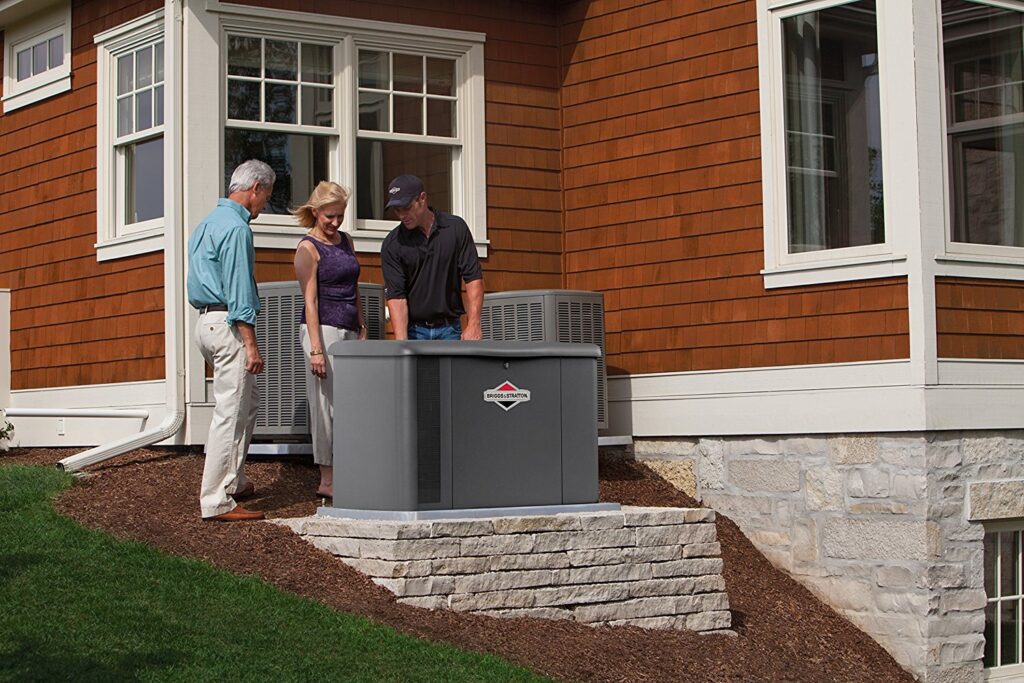
Power output is one of the main factors that differentiate any generator and is extremely important since it will determine how many appliances and other electronic devices you can power. Power outputs on generators can range widely, from just 14 kilowatts on the Champion generator to 22 kilowatts on the Generac 7043 generator, so it’s important to get an idea of how much power you will need to keep everything in your home running smoothly.
While the most accurate way to do this would be to add up the wattage requirements of all the appliances, lights, and other electrical devices in your home, there is an easier way.
There are a number of online calculators that use the square footage of your home and information about the number and types of appliances you have – with extra detail about your air conditioning and heating systems, since these typically consume the most power – to give you an estimate about how much power you need.
In general, it’s a good idea to overestimate the amount of power you’ll need, since you don’t want to find yourself in a situation where you are unable to use essential appliances or are overloading the generator with your power demands. In addition, if you have a natural gas line connection at your home, it is a good idea to account for the fact that all generators have a slightly lower maximum power rating when running on natural gas than when running on liquid propane. If you use your generator somewhat frequently, opting for a more powerful and expensive generator up front can save you money in the long run since natural gas is typically a less expensive fuel source.
Perhaps unsurprisingly, whole-house generators use a lot of fuel. However, the fuel consumption rate of different generators can vary significantly – from just 58 cubic feet of propane per hour for the Champion generator to over 90 cubic feet per hour on either Generac generator.
Unfortunately, calculating which generator will offer you the lowest fuel costs may be harder than it seems at first since fuel consumption also depends on how much power you are drawing. Fuel consumption is typically rated at 50% load, so running closer to the maximum wattage of a generator will consume fuel faster – and what is 80% load on a smaller generator may be only 50% load on a more powerful generator. Thus, you need to have an idea of how much power you will be drawing when using your generator in order to accurately figure out fuel consumption.
Unless you live out in the country far removed from your neighbors, you’ll need to worry about how much noise your generator makes. If you’re using your generator to power a heating or air conditioning system when the power goes out, chances are you’ll also be running the generator throughout the night when loud noise can make your neighbors angry.
The noise level of generators varies according to the size of the generator and according to the noise insulation placed around the engine.
Quiet generators like the Generac models can produce less than 60 dB of noise, while generators like the Briggs & Stratton model produce a significantly louder 69 dB.
Some generators come with additional safety features beyond the industry standards to make sure that you are safe while operating your generator. These include watertight covers to reduce the risk of electrocution and automatic overload protection that will shut the generator down if too much power is drawn.
A standby generator is a massive investment, so you want to be sure that your generator is built to last. One of the best ways to get some security with your purchase is to look for a manufacturer’s warranty, which protects against any construction defects or early failure. Manufacturer’s warranties are most often five years, although Champion offers a longer 10-year warranty.
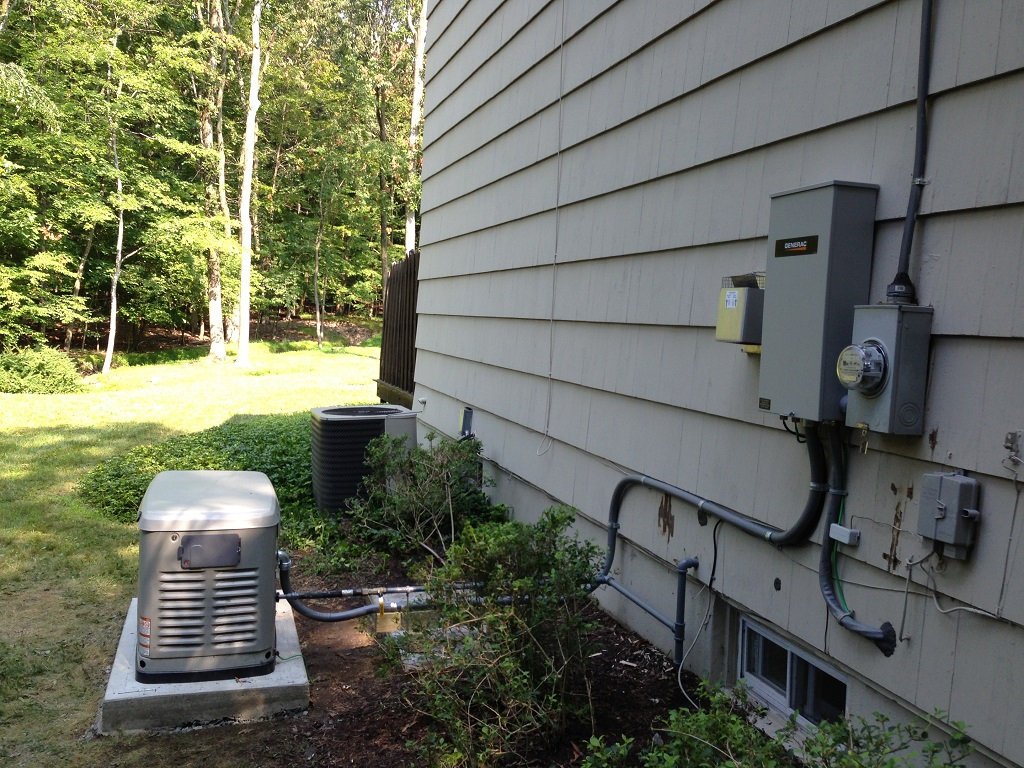
First, in order to have any choice at all, you need to have access to natural gas – unlike propane, which can be bought at the store and stored in your garage for years at a time, natural gas has to be delivered when you need it through underground pipes. If your home doesn’t already have a natural gas line running to it, you will need to stick with liquid propane.
Assuming you do have access to natural gas, there are advantages and disadvantages to both fuels. Propane is highly reliable because you can purchase as many tanks as you may need to withstand an extended power outage at the store years ahead of any natural disaster. Natural gas delivery is often unaffected by natural disasters like storms, but natural gas pipes can be very susceptible to damage during earthquakes or if trees are uprooted.
One big advantage to natural gas is that if the pipes are intact, the fuel supply is essentially unlimited.
In addition, natural gas is the less expensive of the two fuel options in almost all areas that have natural gas access. It also produces lower engine noise levels in many generator models. However, note that natural gas provides less maximum power than liquid propane on the same generator models.
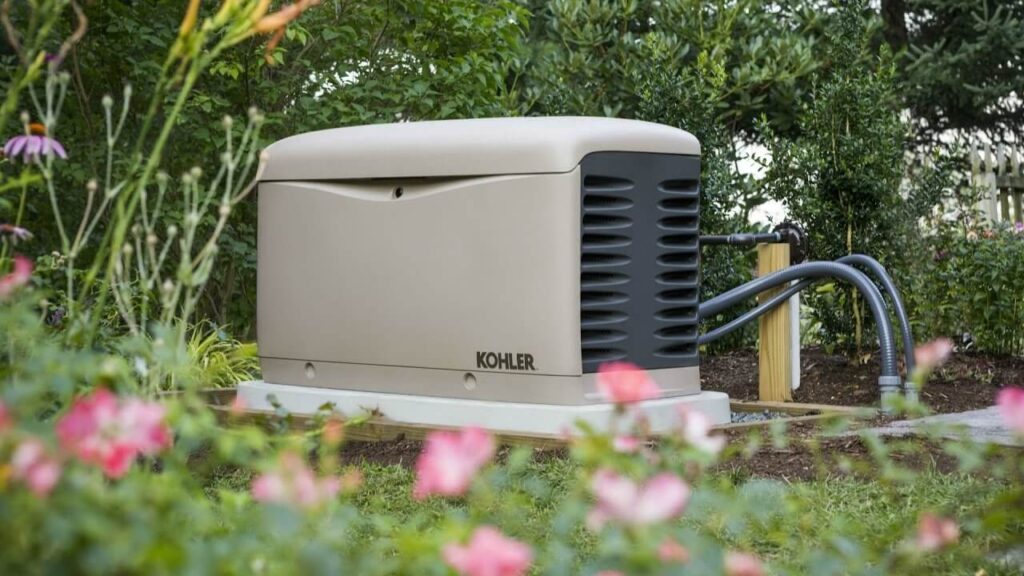
To maintain your generator, it is a good idea to inspect it at least once a month and to do a more thorough inspection every six months. Your monthly inspection can ensure that the unit is clean and that it has enough oil, while the semi-annual inspection can dive deeper to check that the alternator and transfer switches are functioning properly.
Our three overall favorite whole-house generators on the market today are the Generac 7043, the Briggs & Stratton 40484, and the Generac 7036. Both of the Generac standby generators are surprisingly quiet for their size and offer Wi-Fi connectivity so you can monitor the generator’s load, activity, and maintenance cycling from a smartphone app. The Generac 7036 generator is also unique in that it offers the same power rating on liquid propane or natural gas, which is ideal if you plan to frequently switch between the two fuels. If you’re looking for something small but just as powerful, the Briggs & Stratton Q6500 is an ideal choice. Known for its portable and lightweight design, comfortable handles, and 14-hour run time, it provides impressive and safe power for sensitive electronics. We feel the Generac 7043 generator is the overall best whole-house generator thanks to its enormous 22-kilowatt power rating on propane, surprisingly quiet 57 dB noise level, and load management capabilities.
